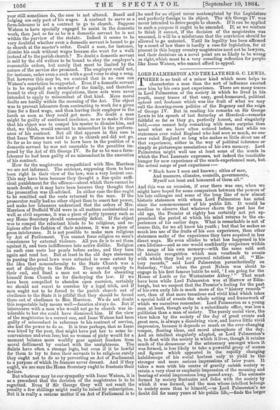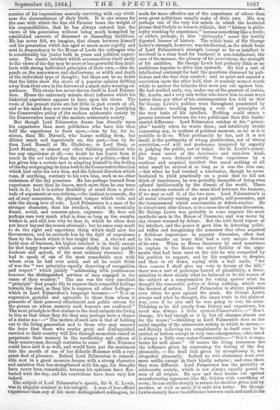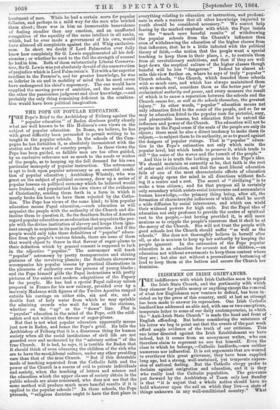LORD PALMERSTON AND THE LATE SIR G. C. LEWIS. T HERE
is no trait of a minor kind which more helps to- characterize a man than the sort of influence exerted- over him by his own past experience. There are many traces- in Lord Palmerston of the society in which he lived in his youth, many traces of that easy, good-humoured, political aplomb and bonhomie which was the fruit of what we may call the drawing-room politics of the Regency and the reign of George IV. But in reading his remarks on Sir George- Lewis in his speech of last Saturday at Hereford—remarks- faithful so far as they go, perfectly honest, and singularly bald,—one cannot help remarking with more surprise than usual what we have often noticed before, that while no- statesman ever ruled England who had seen so much, no one- ever ruled England so long who makes so little direct use or that experience, either in the way of political inference or simply as picturesque associations of his own memory. Lord Palmerston might well use at least some of the words in which the Poet Laureate expresses, not indeed the insatiable- hunger for new experience of the much-experienced man, but. the actual range of past experience :— " Much have I seen and known ; cities of men, And manners, climates, councils, governments, Myself not least and honoured of them all."
And this was an occasion, if ever there was one, when we might have hoped for some comparison between the powers of his lute colleague and some of the long line of now almost historic statesmen with whom Lord Palmerston has acted since the commencement of his public life. It would be needless to observe that whatever charm the past has for old age, the Premier at eighty has certainly not yet ap- proached the period at which his mind returns to the ex- periences of his earlier days. What is remarkable is not of course this, for we all know his youth ; but that he makes so- much less use of the fruits of his own experience, than other statesmen make of the experience they have acquired in less direct ways. He oven alludes to what has happened in his own lifetime—and as one would confidently conjecture within the range of his own memory—with the same cold sort of historic recognition which men vouchsafe to events with which they had no personal relations at all. " His- tory records," said Lord Palmerston parenthetically on Saturday, " that when the great Nelson was about to. engage in his first famous battle he said, I am going for the House of Lords or for Westminster Abbey.' " That must- have been while Lord Palmerston was at Harrow or Edin- burgh, but we suspect that the Premier's feeling for the past of his own early life is much more of the " history records ''' sort, than of that more tenacious and vivid kind which takes a special hold of events the whole setting and framework of which we ourselves remember. Lord Palmerston as a young man at least, though early in a subordinate office, was less a politician than a man of society. The purely social view, the- view taken by the society of the day of great events and great men, is always a dissolving view, and leaves little vivid impression, because it depends so much on the ever-changing temper, floating ideas, and moral atmosphere of the day. And an intellect singularly adapted, as Lord Palmerston's is, to float with the society in which it lives, though it retains. much of the demeanour of the aristocracy amongst whom it was formed, is less likely to take a powerful grasp of scenes and figures which appeared in the rapidly changing kaleidoscope of his social horizon only to yield to the stronger and more serious impressions of later years. It takes a man with his centre of gravity outside society to retain a very clear or emphatic impression of the meaning and bearing of social impressions long passed away. The estimate formed by society fluctuates and fades with the society by which it was formed, and the man whose intellect belongs to society more than to himself,—as Lord Palmerston's no doubt did for many years of his public life, finds the larger number of his impressions scarcely surviving with any vivid- ness the circumstances of their birth. It is one reason for the ease with which the fine old Premier bears the weight of his responsibilities, that he has always entered into the views of his generation without being much hampered by established currents of dissonant or dissuading traditions. He has never felt, we imagine, that chasm between himself and his generation which has aged so much more rapidly and sent in despondency to the House of Lords the colleague who is considerably his junior both in years and political experi- ence. The elastic intellect which accommodates itself easily to the views of the day may be more or less powerful than intel- lects with strong individual principles of their own,—this de- pends on the narrowness and shallowness, or width and depth of the individual type of thought; but there can be no doubt that the latter show the strain of a popular opinion drifting away from their own in the furrows of a much more wearing ex- perience. This strain has never shown itself in Lord Palmer- ston. Hence the extremely minute direct influence which his historical experience appears to have upon his views. The roots of his present views are but little in past events at all, and so his mind does not recur to them when he is justifying the Conservative policy of the modern aristocratic society by the Conservative sense of the modern aristocratic society.
But though Lord Palmerston draws less directly upon his experience than most politicians who have less than half the experience to draw upon,—less by far, for in- stance, than Mr. Disraeli, who learns nothing from, but dilates much and ingeniously on, the past,—leas by far than Lord Russell or Mr. Gladstone, or Lord Grey, or Lord Stanley, or almost any other thinking politician who has any experience at all,—no doubt he has learnt from it much in the art rather than the science of politics,—that it has given him a certain tact in adapting himself to the feeling of the day and gauging its force bothin the Conservative direction which best suits his own bias, and the Liberal direction which runs, if anything, contrary to his own bias, such as no other statesman of the day possesses. He has perhaps learned from experience more than he knows, much more than he can trace back to it; but it is rather flexibility of mind than a pleni- tude of arguments or convictions,—the instinct to concede, the art of easy concession, the pleasant temper which veils and aids the strong love of rule. Lord Palmerston is a man of far stronger character, than his intellect, which is essentially fluent, social, and common-place, expresses. He does not perhaps care very much what is done so long as the country wishes it, and still less why he does it, which he often does not know beyond the reason aforesaid ; but he cares very much to do the right and opportune thing which shall save his Government, and he succeeds less by the light of experience than by the knack which it has taught him. A shrewd and lucid man of business, his higher intellect is in itself, except for that happy humour which arises chiefly from his perfect bonhomie and aplomb, of the most ordinary character. He had to speak of one of the most remarkable men with whom even he had ever acted, and all he could think of was the " two principles equally deserving of recognition and respect" which .justify "celebrating with posthumous honours the distinguished services of men engaged in the cause of their country." The one was the very excellent "principle" that people like to express their respectful feelings towards the dead, as they like to express all other feelings— which in Lord Palmerston's language becomes :—" It is an expression grateful and agreeable to those from whom it proceeds of their personal attachment and public esteem for the person on whose memory such honours are conferred." The next principle is that statues to the dead animate the living to live so that when they die they may perhaps have a chance of a statue too :—" The motive of such acts is that of holding out to the living generation and to those who may succeed the hope that those who render great and distinguished services to their country will live through memorials raised to perpetuate their memory in the recollection and esteem of their countrymen through centuries to come." Mrs. Trimmer could have said it as well, and would have put the sentiment into the mouth of one of her didactic Mammas with a very great deal of pleasure. Indeed Lord Palmerston is remark- able now in a great measure because with a strong character and ambition that has strengthened with his age, his thoughts have never been remarkable, because his opinions have fluc- tuated with the day, and his convictions have been very few indeed.
The subject of Lord Palmerston's speech, Sir G. C. Lewis, was in singular contrast to his eulogist. A man of less official experience than any of his more distinguished colleagues, he made far more effective use of the experience of others than even great politicians usually make of their own. His was perhaps one of the very few minds in which the hacknied phrase that Carlyle so loves to ridicule, that " history is philo- sophy teaching by experience," became something like a truth; or rather, perhaps, to him ' philosophy' meant the lucidly digested lessons of history. The whole basis of Sir George Lewis's strength, however, was intellectual, as the whole basis of Lord Palmerston's strength (except so far as intellect is involved in a clear head for business) is non-intellectual, the ease of his manner, the pliancy of his convictions, the strength of his ambition. Sir George Lewis had probably little or no ambitious impulse to drive him upwards. He had a sort of intellectual contempt for half the questions discussed by poli- ticians and the fuss they created ; and so quiet and assured a conviction upon the other half, that it scarcely seemed worth while to answer the fallacies that were put out against him. He had studied early, too, under one of the greatest of jurists, Mr. Austin, and a very able writer who knew him in some ways better than any other of his contemporaries has told us that Sir George Lewis's politics were throughout penetrated by Mr. Austin's teaching forming a code of principles at the very basis of his intellect. Nothing could create a greater contrast between the two politicians than this funda- mental difference. Lord Palmerston catches at his "princi- ples" hastily when he wants them; and intuitively avoids expressing any, in matters of political moment, as far as it is possible to do so. What pertinacity he has, and it is not small, is 'the pertinacity of strong predilection, not of strong conviction,—of will and preference tempered by sagacity in judging the public, not of belief. Sir G. Lewis's princi- ples were never of the doctrinaire and cast-iron kind, for they were deduced strictly from experience by a cautious and sceptical intellect that cared nothing at all what result he arrived at so long as it was the true one, —but when he had reached a conclusion, though he never hesitated to yield practically on a point that he did not think of importance, he was probably incapable of being even afected intellectually by the dissent of the world. There was a curious contrast of the same kind between the humour, if we may so call it, of the two men. Lord Palmerston's is- all social vivacity resting on good spirits, self-possession, and the temperament which conversation or debate excites. He is always best after dinner, or in a cross-fire of warm discussion. Sir George Lewis was probably in some respects the most apathetic man in the House of Commons, and was never by any chance warmed by debate. But the cold lucid vigour of his intellect, and the power it gave him in detecting politi- cal trifles and recognizing the nonsense that often acquired' a fictitious importance in popular discussion, often lent to his remarks an irony that had a very unique flavour of its own. When as Home Secretary ho used sometimes to explain to the House the utter futility of the argu- ments that had been used on the side he was compelled by his position to support, and by his scepticism to despise, and then to sit down, saying with a half smile, " for these reasons I shall give my vote in favour of the bill," there was a sort of grotesque hatred of plausibility, a deter- mination to show clearly what he believed to be the reason of the subject as a compensation for voting against what ho thought the reasonable policy of doing nothing, which was the keenest of satires. Lord Palmerston is always plausible even when he goes against the grain. Sir George Lewis always said what he thought, the exact truth in the plainest way, even if he also said he was going to vote for error. Thinking as he did purely from history and experience, his creed was. always a little cynical-Conservative, —" Don't change, it's bad enough as it is, but all changes almost are for the worse ;"—thinking as Lord Palmerston does on the social impulse of the aristocratic society in which he moves,— and Society believing too complaisantly in itself over to be cynical at bottom except in very rare, emergencies,—his creed is always a little rose-water-Conservative,—" Don't change, better let well alone." Of course the living statesman has the influence given by expressing the feeling of the day pleasantly, — the dead that given by strengthening it, not altogether pleasantly. Indeed no two statesmen were ever more unlike except in their kindly natures ; and even there they were different. Lord Palmerston has the geniality of aristocratic society, which is not always equally genial to men of all origins. He now and then breaks out ngainst manufacturing opponents like Mr. Cobden with something of scorn; he can strike sharply in return for the blow given him by another, as well as smile if it suite him better. Sir George Lewis scarcely knew the difference between rank and rank iu his treatment of men. While he had a certain scorn for popular fallacies, and perhaps in a mild way for the men who bruited them about ; there was in him an immoveable benevolence of feeling steadier than any emotion, and an unaffected recognition of the equality of the same intellect in all ranks, which, had he ever made a government of his own, would have silenced all complaints against the old Whig exclusive- ness. In short we doubt if Lord Palmerston ever fully knew how completely Sir G. Lewis supplemented all his defi- ciencies ; or whether he used to the full the strength of counsel he had in him. Both of them substantially Liberal. Conserva- tive, Sir G. Lewis was yet absolutely devoid of the conservatism of prejudice which is Lord Palmerston's. Yet with a far superior intellect to the Premier's, and far greater knowledge, he was so inferior in vie and in mobility of mind that he need never have endangered his chief's supremacy. The one would have supplied the moving power of ambition, and the social ease, the other the passionless judgment and clear knowledge,—and probably the only thing remaining deficient in the combina- tion would have been political imagination.
































 Previous page
Previous page